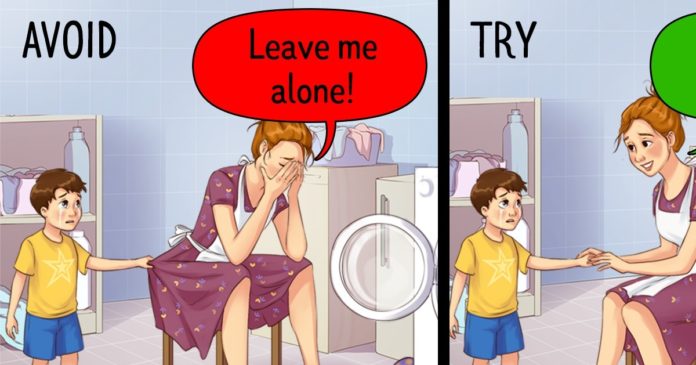
Words have a great deal of power. When we are young, the things we learn from our parents can get stuck in our memories forever. Words of love and wisdom guide us and help us to be better people, while words spoken with anger and disbelief put us in doubt for years to come. It turns out that even a normal, seemingly safe and innocent phrase can undermine the self-esteem of a child and make them feel insecure.
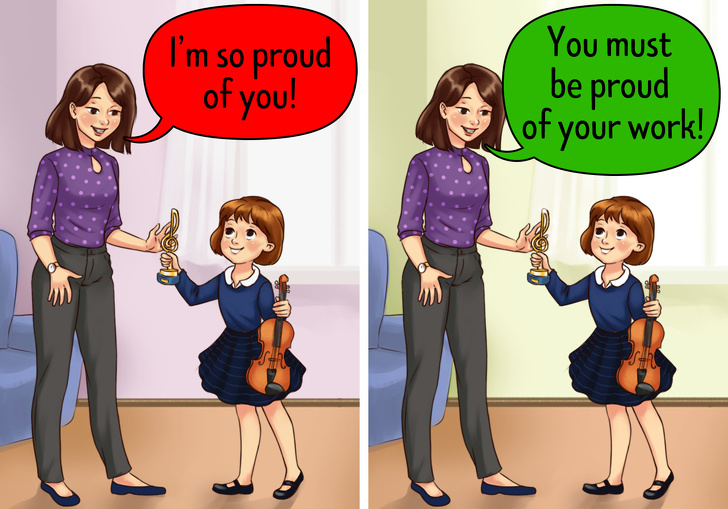
Avoid: “I’m so proud of you!” or “Great job!”
Try: “You must be so proud of your work!” or “You did that puzzle so fast!”
The first phrase seems innocent, but it’s tricky. When parents praise kids for every little thing from finishing their dinner to drawing a picture, the praise becomes meaningless. Instead, try to praise the specific things related to your kid’s accomplishments and encourage them to be self-critical and proud of the things they did really well.
Avoid: “Wait till your dad (mom) comes back home!”
Try: “Please don’t do that again. It makes me feel upset because…”
When you say the first phrase you “postpone” the consequences of your kid’s wrong behavior, and chances are, by the time the other parent comes back home, the kid will have forgotten what happened. What’s more, you frighten your child with their dad or mom turning your partner into a “bad cop” and diminish your own authority. Try to solve the problem yourself and explain to the child why you are upset with their behavior.
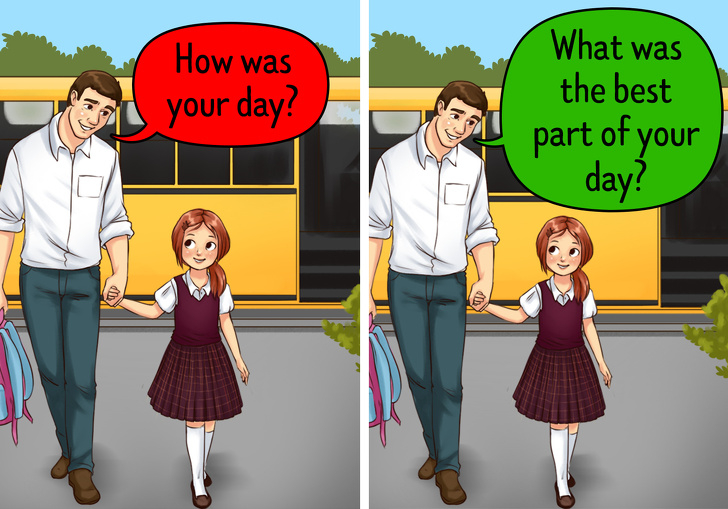
Avoid: “How was your day?”
Try: “What was the best part of your day?”
“How was your day?” is actually an empty question that implies an answer just one or 2 words long. If you really want to know how your child’s day was, ask specific questions that encourage long and detailed answers.
Avoid: “No dessert until you finish your meal.”
Try: “First, we eat the soup, and then we have a dessert.”
By saying the first phrase you increase the value of the treat and diminish the joy from the meal itself. Try twisting your phrase a bit, the soup and the cake both seem tasty, but, as we know, they should be eaten in a certain order.
Avoid: “Hurry up!”
Try: “Let’s hurry.” or “Let’s see who’s the first to put on their sneakers!”
When you push your kid to do things faster you increase their stress and make them fearful that they will be late or miss something. Try to twist the phrase in such a way that your kid feels that you are both on the same team.
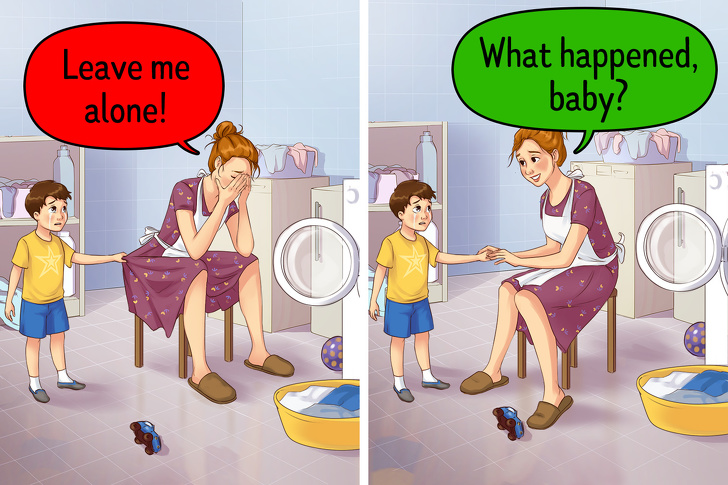
Avoid: “Leave me alone!”
Try: “What happened?” or “Please give me a minute to finish this, and we’ll talk, alright?”
If you’re always brushing your kid off, he or she will soon start thinking there’s no point in asking you for help or advice at all, because you’re always busy. When kids don’t get enough support in their childhood, they will be less likely to share their emotions and thoughts with their parents when they get older. If you cannot give your child all of your attention right away, patiently ask them to give you a couple of minutes to finish the things you’re doing.
Avoid: “Shame on you!”
Try: “The thing you did makes me feel upset, because…”
Your child may still be too small to understand what shame really is. This empty phrase doesn’t give the kid an idea of why the thing he or she did was wrong. What’s more, a study has shown that shaming can make some kids more aggressive. Try to explain to your child what was wrong about their behavior and how to avoid it in the future.
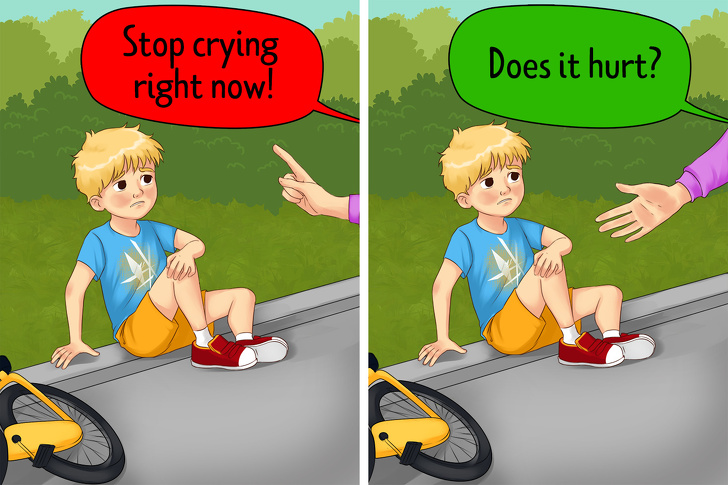
Avoid: “Don’t cry!”
Try: “What happened?” or “What made you so upset?”
Crying is totally normal, even if the reason that your child is crying doesn’t seem that important to you. By saying, “Don’t cry!” you diminish your kid’s feelings, and it can make them feel that their emotions are not important. Instead, you can try to show that you care and that you want to help.
Avoid: “There’s nothing to be afraid of!”
Try: “I see you are afraid, and I’m here with you.”
There’s no way that the first phrase can comfort your child if he or she is already afraid. And again, it sends the child a message their feelings don’t count. Instead, empathize with your kid’s feelings and discuss the fear and its cause.
Avoid: “Because I said so!”
Try: “It’s time to turn off the TV and start doing your homework.”
The first phase doesn’t give your child an idea of why they should stop or start doing something you want them to. Instead, it may make your kid feel like they don’t have any rights, and it’s you who’s always in control. Try giving simple understandable instructions and briefly explain the reasons behind your words.
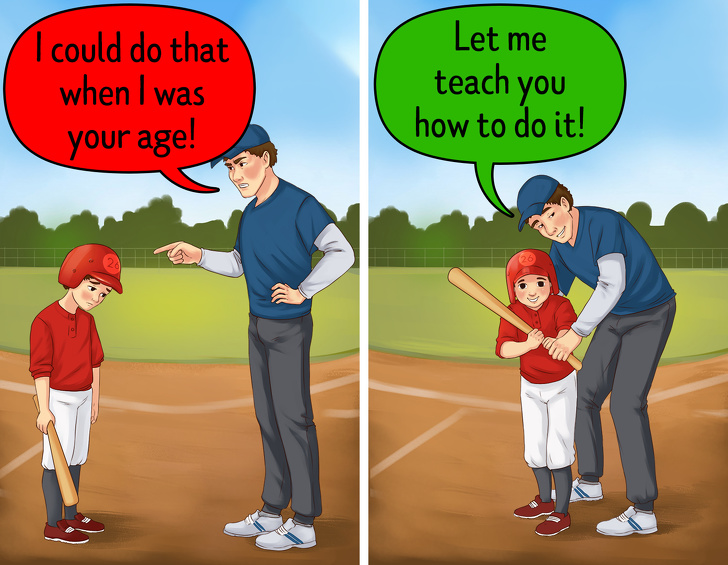
Avoid: “I could do that when I was your age!”
Try: “Let me teach you how to do it!”
All kids develop differently and comparing your child with others, even if it’s you, is not the best idea. Instead, try to teach your child how to do something they can’t do yet.
Avoid: “I’m disappointed in you!”
Try: “The thing you did makes me feel upset, because…”
The phrase, “I’m disappointed in you” sounds to a child just the same as “You disappoint me,” and it can make them feel like they don’t meet your expectations. Try to explain how your kid’s actions really make you feel without using the words “disappointed” and “disappoint.”
Do you have kids? Would you add the phrases to our list that you avoid or try to use more often when talking to your child?
Illustrated by Alena Sofronova
source
